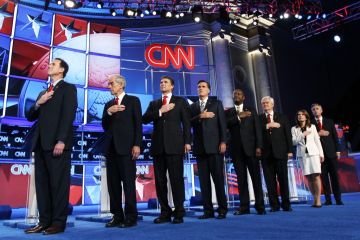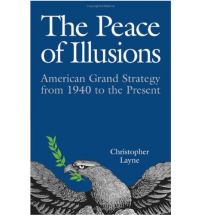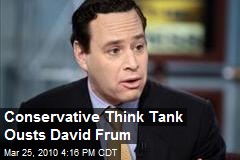 On November 22, 2011, CNN hosted a debate between the Republican candidates for the presidential nomination, this time dedicated to the theme of national security. The debate was sponsored by the Heritage Foundation and the American Enterprise Institute (AEI), two of the most conservative think tanks in the US, with considerable influence in shaping policies and advising members of the Republican party. Both think tanks count among their employees former members of the Bush administration and hard core neoconservatives. Even prior the beginning of the ‘show,’ one could expect an ultra conservative, neoconservative direction on the choice of the questions and their analyses. The majority of the questions asked by the audience were either from members of Heritage or the AEI. The environment and atmosphere was undeniably pro-GOP.
On November 22, 2011, CNN hosted a debate between the Republican candidates for the presidential nomination, this time dedicated to the theme of national security. The debate was sponsored by the Heritage Foundation and the American Enterprise Institute (AEI), two of the most conservative think tanks in the US, with considerable influence in shaping policies and advising members of the Republican party. Both think tanks count among their employees former members of the Bush administration and hard core neoconservatives. Even prior the beginning of the ‘show,’ one could expect an ultra conservative, neoconservative direction on the choice of the questions and their analyses. The majority of the questions asked by the audience were either from members of Heritage or the AEI. The environment and atmosphere was undeniably pro-GOP.
The issues covered during the two hours were: increasing the power of the Patriot Act in fighting terrorism; securing US interests in Pakistan; the next step in the war in Afghanistan; the backing of Israel, even in case of an attack against Iran; new rounds of sanctions against Iran; development and foreign aid; defense cuts; protection of the borders and stopping drug cartels; illegal immigration; Syria as a US interest?; and Al-Shabab in Somalia. So quite a broad agenda.
Not surprisingly, three groups can be identified among the eight GOP candidates: the isolationist (Ron Paul); the exceptionalists (Mitt Romney, Rick Santorum, Newt Gingricht, Jon Huntsman); and the clueless (Rick Perry, Michele Bachmann, and Herman Cain).
Ron Paul has historically been one of the most consistent candidates especially in his view on foreign policy and national security. His argument can be divided into three narratives: first, Congress should be declaring war, not the President; second, the need to maintain a fair balance between security and liberties; third, no interference in domestic affairs of other countries.
The second group, or the exceptionalists, underlined the uniqueness of US power and the US as a country. As described by Mr. Santorum, “the US is the shiny city on top of the hill leading the world.” All of them agreed to increase the power of Patriot Act and even some of them – read Mr. Santorum – were in favor of racial profiling in the fight against terrorism. However, a division emerged around the question of Afghanistan, on one side, Mitt Romney called for a progressive removal of US troops, which is the current Obama strategy based on the advice of US Generals; while, Jon Huntsman called for a full removal of US troops as the missions – removal of the Taliban from Kabul, destroying Al Qaeda, holding free elections – have been attained. Mr Huntsman underlined that nation-building is not in the interest of the US. On the question of Iran, all of them expressed their support for Israel and raised concerns about a nuclear Iran. The strategies in order to limit Iran are quite unclear; some talked of regime change (Gingricht), while others of maintaining sanctions (Romney and Huntsman).
The third group exposed their ignorance in the questions of national security and foreign policy. Ms. Bachmann was always referring to intelligence and the need to gather more intelligence for the simple reason that she serves on the House Permanent Select Committee on Intelligence. Ms. Bachmann was coveting this seat in order to give herself credentials needed in case of a presidential run. Mr Cain and Perry did neither convince nor show any knowledge of foreign policy matters. They were simply restating facts and following the ‘admitted’ narratives among conservatives.
Throughout the debate, one could see the clear lack of knowledge on the question of foreign policy. The arguments raised were too simplistic and lacked considerable depth. The opinions were one-sided with no understanding of others – either enemies and/or allies. The concept of soft power or smart power were dismissed in favor of over-used ideas of hard power, coercion, and national interests. Furthermore, this debate highlighted that American exceptionalism is still extremely present in the minds of conservative policy-makers. US national security must be enforced at any costs and could lead to violation of international law, and that national sovereignty (especially of Pakistan and Iran) can be violated in the name of US security. Ms. Bachmann, in previous speeches, declared that she considers torture as a valuable instrument to increase national security and gain valuable information.
The blame game of President Obama’s foreign policy and presidency has been considerable and probably the only point that all candidates agreed on. Mr. Obama has been portrayed as a weak commander in chief endangering the national security of the US as well as its power. Oftentimes, GOP candidates claimed that Obama does not believe in American exceptionalism. However, the positive dimensions of Obama’s foreign policy were either diminished or criticized. For example, on the killing of Osama bin Laden, all GOP candidates used the famous ‘we’ to describe a successful mission instead of giving credit to the Obama administration. On the mission in Libya, they all questioned the necessity of the operations as US interests were not at stake even; though the mission was a successful case of multilateralism and enforcement of the concept of the Responsibility to Protect (R2P).
Another interesting point was the discussion around the questions of cutting the deficit and balancing the budget. Both issues were framed as a matter of national security. However, some of the comments went beyond the general question of national security per se. With the exception of Mr. Paul, all GOP candidates claimed that US power must be reinforced through a stronger army and more military capabilities. Their rationale is that a strong army equals a secure nation. The GOP candidates also expressed the need to be more involved abroad and protect US interests at any costs. None of them is probably familiar with the actual discussion about the design of a new US grand strategy, which is moving towards offshore balancing in order to avoid over-stretching. Part of the offshore balancing strategy consists of strengthening alliances and cooperation, which has been at the heart of President Obama latest trip to the pacific region. Cooperation – with the exception of Israel – was not part of the debate. The issues of NATO and cooperation with the Europeans on terrorism, Iran, and other pressing international issues were not touched upon. This debate was not surprisingly in the continuity of the hegemonic mentality of the early post-Cold War period, or as argued by Mr. Romney, the ‘American century.’ The changing balance of power, which has led to a multipolar world, was not tackled. The GOP candidates live in the ‘peace of illusions,’ to repeat Christopher Layne’s argument.
matter of national security. However, some of the comments went beyond the general question of national security per se. With the exception of Mr. Paul, all GOP candidates claimed that US power must be reinforced through a stronger army and more military capabilities. Their rationale is that a strong army equals a secure nation. The GOP candidates also expressed the need to be more involved abroad and protect US interests at any costs. None of them is probably familiar with the actual discussion about the design of a new US grand strategy, which is moving towards offshore balancing in order to avoid over-stretching. Part of the offshore balancing strategy consists of strengthening alliances and cooperation, which has been at the heart of President Obama latest trip to the pacific region. Cooperation – with the exception of Israel – was not part of the debate. The issues of NATO and cooperation with the Europeans on terrorism, Iran, and other pressing international issues were not touched upon. This debate was not surprisingly in the continuity of the hegemonic mentality of the early post-Cold War period, or as argued by Mr. Romney, the ‘American century.’ The changing balance of power, which has led to a multipolar world, was not tackled. The GOP candidates live in the ‘peace of illusions,’ to repeat Christopher Layne’s argument.
The decline of American power is a redline, never touched on by any of the candidates. Unfortunately, it is a reality. The answers and analyses were not appropriate to the reality of world politics and the changing nature of international relations. How can a debate on foreign policy go on for two hours without mentioning the rise of China, Brazil, Turkey and India? The answer is simple: denial over the rise of new foreign policy actors.
The last question from the audience was, “which national security matter that was not addressed during the debate concerns you the most?” Mr Santorum expressed his concerns with Central America and the spread of communism, while Mr. Paul showed his fear about American over-reaction to world events, which could lead to another war. Mr. Perry underlined his concerns on the rise of China as well as cybersecurity. Mr Romney also argued that China was a main threat, but a long-term one, whereas Iran is the present menace. Mr. Cain showed his concerns over the question of cybersecurty. Mr Gingricht talked about the threats of WMDs and cyberattacks. Ms Bachmann underlined the threat of terrorism. Last but not least, Mr. Huntsman expressed his concerns over the rise of China as well as the high domestic unemployment and high debt of the US economy.
Two conclusions can be made from this debate: first, all the candidates – with the exception of Ron Paul – if elected will be in the clear continuity of the  Bush’s foreign policy; second, they all live in a fantasy that the 21st will be an ‘American Century.’ This notion of fantasy has been used and analyzed by David Frum, former speechwriter for President Bush, in an excellent article published in New York Magazine. David Frum has been a republican for most of his life, worked for the GOP, and for conservative think tank such as American Enterprise Institute. But after being too vocal and critical about the current course of evolution of the Republican party, he has been excluded and been in ‘intellectual exile’ for some time now. His writings clearly illustrate the lack of touch of the GOP with reality. He goes quite far when for example he claimed that conservative think tanks “increasingly function as public-relations agencies, conservatives have built a whole alternative knowledge system, with its own facts, its own history, its own laws of economics.” This was clearly the case throughout the debate.
Bush’s foreign policy; second, they all live in a fantasy that the 21st will be an ‘American Century.’ This notion of fantasy has been used and analyzed by David Frum, former speechwriter for President Bush, in an excellent article published in New York Magazine. David Frum has been a republican for most of his life, worked for the GOP, and for conservative think tank such as American Enterprise Institute. But after being too vocal and critical about the current course of evolution of the Republican party, he has been excluded and been in ‘intellectual exile’ for some time now. His writings clearly illustrate the lack of touch of the GOP with reality. He goes quite far when for example he claimed that conservative think tanks “increasingly function as public-relations agencies, conservatives have built a whole alternative knowledge system, with its own facts, its own history, its own laws of economics.” This was clearly the case throughout the debate.
Looking through a European angle, the GOP candidates are sending a wrong message, or a message of deja-vu to the other side of the pond. It could very much mean that Mars is back.